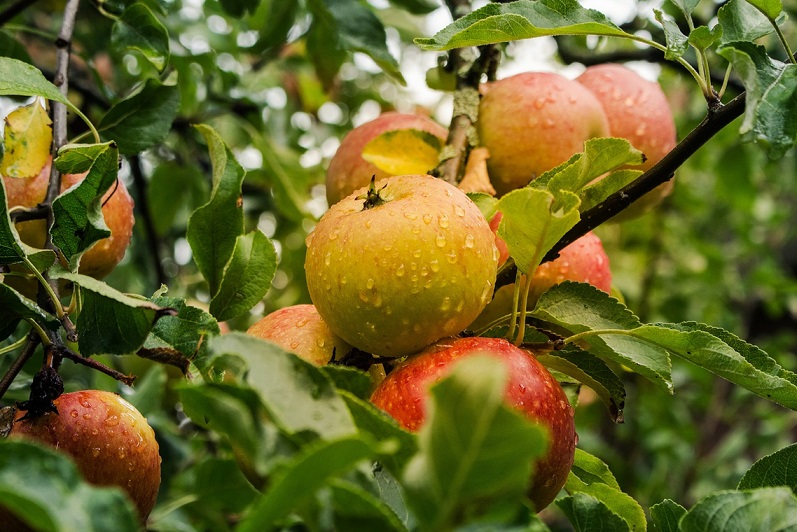
- The jackfruit which may weigh up to 110 pounds is the heaviest fruit in the world.
- The Southeast Asian fruit from the tropics known as the rambutan gets its name from the Malay term for “hairy” because of its silky, spiky hair.
- Tomatoes and avocados are examples of fruit that are technically categorised as berries.
- The durian is regarded as the “king of fruits” in Southeast Asia, but it also goes by the moniker “stinky fruit” due to its offensive odour.
- The pomegranate is one of the oldest fruits that has ever been discover and there is proof that it was grown in prehistoric Mesopotamia.
- Originally called the Chinese gooseberry, the kiwifruit’s name was change to kiwifruit to increase its marketability in New Zealand.
- The banana is the fruit with the biggest crop in the world.
- The African native baobab tree has fruits that may store up to 32 gallons of water.
- Chocolate is made from the fruit of the cacao tree which is a native of South America.
- Coffee is made from the fruit of the African-born coffee tree.
- Olive oil is made from the fruit of the olive tree which is a native of the Mediterranean region.
- Palm oil is produced from the fruit of this tropical tree which is also used as a food source in many parts of the world.
- Spanish Catholic missionaries gave the passion fruit its name after the Spanish term for “passion” believing that the fruit’s physical attributes represented Christ’s passion.
- Japan’s national fruit is the persimmon.
- South America is the original home of the pineapple, a tropical fruit.
- Due to its high pectin content, quince fruit is frequently used to make jams and jellies.
- High in vitamin C, soursop fruit is used to make juice, ice cream and other delicacies.
- The name “star fruit” refers to the fruit’s cross-sectional shape which resembles a star.
- Although originally from Africa, the tamarind is today a tropical fruit that may be found all over the world.
- A hybrid of orange, tangerine and grapefruit is ugli fruit.
Additional fruit information
- There is evidence of date palm agriculture extending back to ancient Mesopotamia and Egypt making it one of the oldest fruits in the world.
- Elderberry fruit has been used for ages in traditional medicine to cure a variety of diseases because it is high in antioxidants.
- The fig tree produces fruit that is high in fibre and is packed with vitamins and minerals.
- Wine, juice and raisins are all produced from grapes.
- Guava fruit which has a lot of vitamin C, is frequently used to make jams, jellies and juices.
- The vitamin C-rich fruit of the kumquat tree is frequently used to make preserves and marmalades.
- Lemon fruit is a prominent ingredient in cooking and baking and is high in vitamin C. It is also frequently used to make lemonade.
- Lime juice, a key component in many cocktails, is frequently made from the lime tree’s fruit which is abundant in vitamin C.
- The lychee tree produces fruit that is rich in vitamin C and is frequently used to make delicious candies and pastries.
- Mango fruit contains a lot of vitamin A and is frequently used in sweets, chutneys and smoothies.
- Mulberry fruit which has a lot of vitamin C, is frequently used to make jams, jellies and syrups.
- The nectarine tree produces fruit that is rich in vitamin A and is frequently used to make jams and sweets.
- Due to the fruit’s high vitamin C content oranges are frequently utilised to make juice, zest and marmalade.
- The papaya tree produces fruit that is high in vitamin C and is frequently used to make juice, smoothies and meat tenderizers.
- The peach tree produces fruit that is high in vitamin A and is frequently used to make jams and sweets.
- Pear tree fruit is strong in fibre and frequently used to make jam and sweets.
- The persimmon tree produces fruit that is rich in vitamin A and is frequently used to make jams and pastries.
- Pineapple juice and other tropical drinks frequently contain the fruit of the pineapple tree which is high in vitamin C.
- Jams, jellies and syrups are frequently made from the antioxidant-rich fruit of the raspberry tree.
- The strawberry tree produces fruit that is rich in vitamin C and is frequently used to make jams, syrups and sweets.
20 Advantages of fruits for health
- High in vitamins and minerals: Fruits are a great source of vitamins and minerals, especially vitamin C, potassium and folate.
- Fruits are abundant in antioxidants: Antioxidants can help shield the body from damage brought on by free radicals.
- May help lower blood pressure: Fruits high in potassium, such bananas and avocados, may help lower blood pressure.
- May help improve heart health: Fruits’ strong antioxidant content may help protect the heart from harm and reduce the risk of heart disease. This can help enhance heart health.
- May help with weight management: Fruits are an excellent dietary choice for weight management because they are low in calories and high in fibre.
- May help reduce risk of cancer: Berries, for example are rich in antioxidants which may help reduce the risk of some cancers.
- May improve digestion: Fruits’ high fibre content can aid in promoting regular bowel movements and preventing constipation which may improve digestion.
- Fruits’ high fibre content may aid in the management of diabetes: For those who have the disease, fibre can assist control blood sugar levels.
- Fruits’ strong antioxidant content may benefit skin health: Antioxidants can shield the skin from harm and enhance its general appearance.
- May improve eye health: Some fruits including oranges and kiwis, are high in vitamin A which is necessary for maintaining excellent eye health. This may improve eye health.
- May boost immunity: Fruits’ high vitamin and antioxidant content may aid to strengthen the immune system and lower the risk of infection.
- May improve brain function: Some fruits like blueberries and pomegranates, have significant antioxidant content that may aid boost brain function and lower the risk of cognitive decline.
- Fruits’ high antioxidant content may help reduce inflammation: Antioxidants lower the chance of developing certain diseases by reducing inflammation in the body.
- May improve bone health: Some fruits like oranges, are high in vitamin C which is necessary to keep strong bones. This may increase bone health.
- May improve mental health: Fruits’ strong antioxidant content may help with mood enhancement and lower the risk of depression and anxiety.
- May help with pregnancy: Fruits that are high in folic acid, such as oranges and kiwis, may be helpful during pregnancy. Folic acid is necessary for a healthy foetal development during pregnancy.
- May help with oral health: Fruits may promote oral health and lower the incidence of tooth decay and gum disease since they are abundant in antioxidants and vitamins.
- May improve athletic performance: Fruits’ high concentration of vitamins, minerals and antioxidants may help athletes perform better while lower their risk of injury.
- May help with hair health: Fruits may promote hair health and prevent hair loss because they are rich in vitamins, minerals and antioxidants.
- May improve sleep: Some fruits, like cherries and kiwis, are high in melatonin, a hormone that aids in controlling sleep. This may promote sleep.









